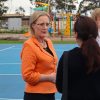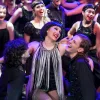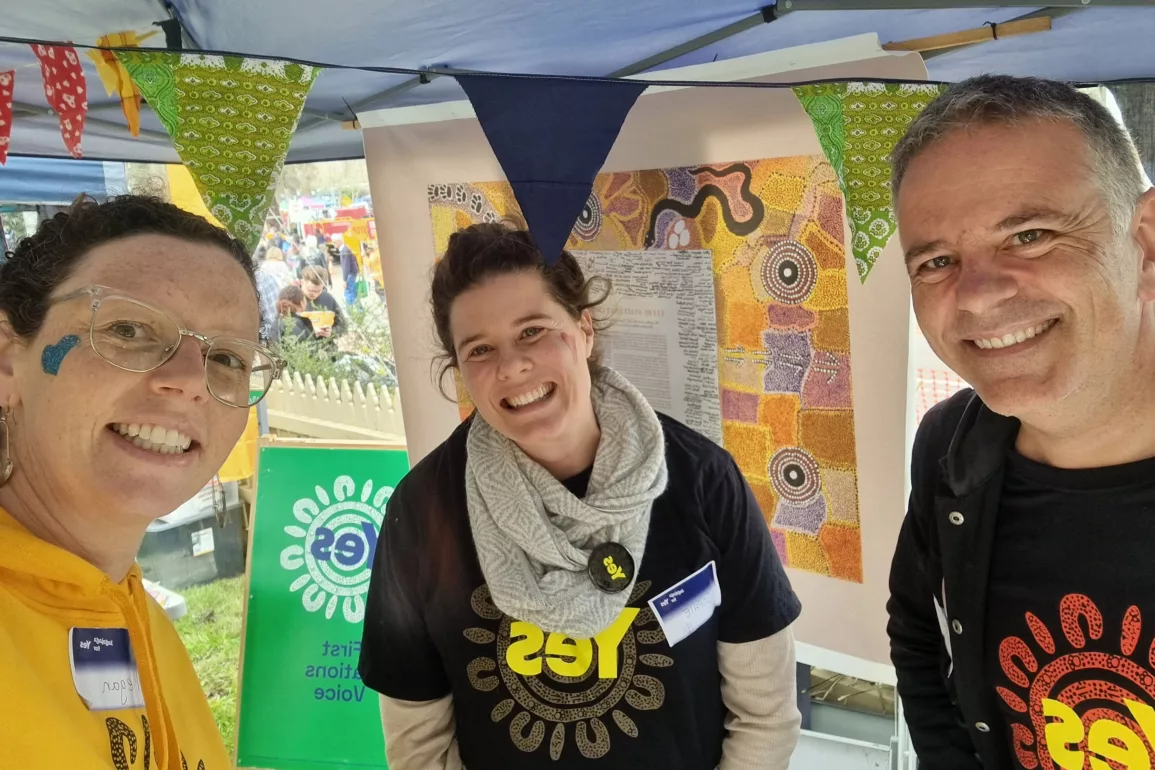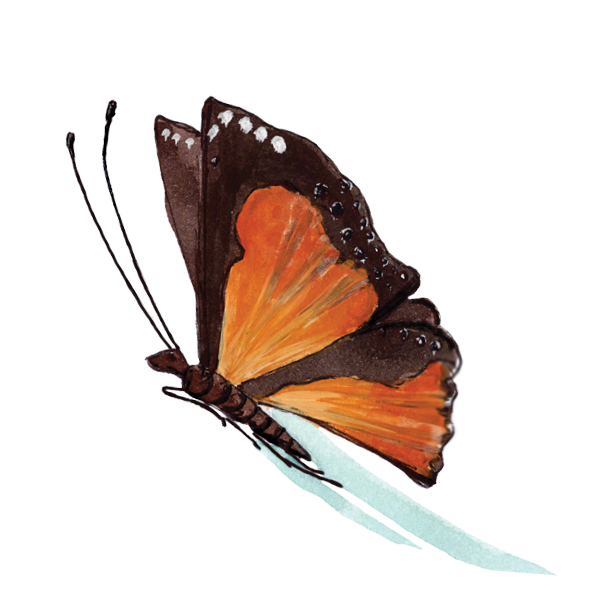The annual Wattle Festival in Hurstbridge is a truly special event, blending the charm of a country town fair with the vibrancy of a city festival. Participating in a stall at this year’s event was an exciting new experience for me. “Jagajaga for Yes” and “East McEwen for Yes” organised a combined stall to offer information and chats about the upcoming referendum on the Aboriginal and Torres Strait Islander Voice to Parliament, and I took part.
The stall was set within the grounds of Allwood House alongside other community groups such as Friends of Nillumbik and Clean Energy Nillumbik. It attracted numerous visitors eager to engage and discover more about this important issue.
Our two “Yes” campaign groups are non-partisan and comprise a really fascinating range of people; some are supporters or members of competing political parties. Many others don’t usually get involved in politics or campaigning in any way at all.
As the day unfolded, and festival goers passed through, it became evident that many people have only heard about this referendum through media and reporting narratives. It means that much of what they’ve heard has been point scoring and political barbs which amplify divisions, sow confusion and don’t serve any of us well.
For an idea that didn’t come from Canberra in the first place, one which goes to the heart of how our political system, listens to the needs of ordinary people rather than politicians, this is a limited way to become informed. We were delighted to find that people wanted more information and to really understand!
Ultimately… the most important thing is that we all take some time to think deeply about this issue.
In one of the few quiet moments of the day, I joked with another of our volunteers that usually the two of us would be standing opposite each other wearing different t-shirts. We’d be handing out competing brochures and encouraging people to vote for our own party and not for the other’s.
A third volunteer chimed in “and I’d be trying to avoid you both just to get into the polling booth so I could vote!”
It’s a refreshingly unifying feeling being among such a diverse group of people passionately working together towards a common goal.
What made my festival experience truly heartening, was the obvious curiosity of people.
Our stall offered a wealth of information, from printed copies of the Uluru Statement from the Heart, referendum processes, the exact words of the constitutional amendment. We provided concise explanations about how The Voice to Parliament will help improve future legislation and policies by improving effectiveness and reducing the chance of failure.
The chats we had with festival goers revealed a range of interested people. This is not an issue that splits down the classic Australian political fault lines. How could it? An Aboriginal and Torres Strait Islander Voice to Parliament won’t be governing us – it will, instead, be a conduit for expert advice to the future governments we elect.
Having an opportunity to explain what The Voice is, how it will work, what its role would be and, conversely, what its role wouldn’t be was felt a real privilege.
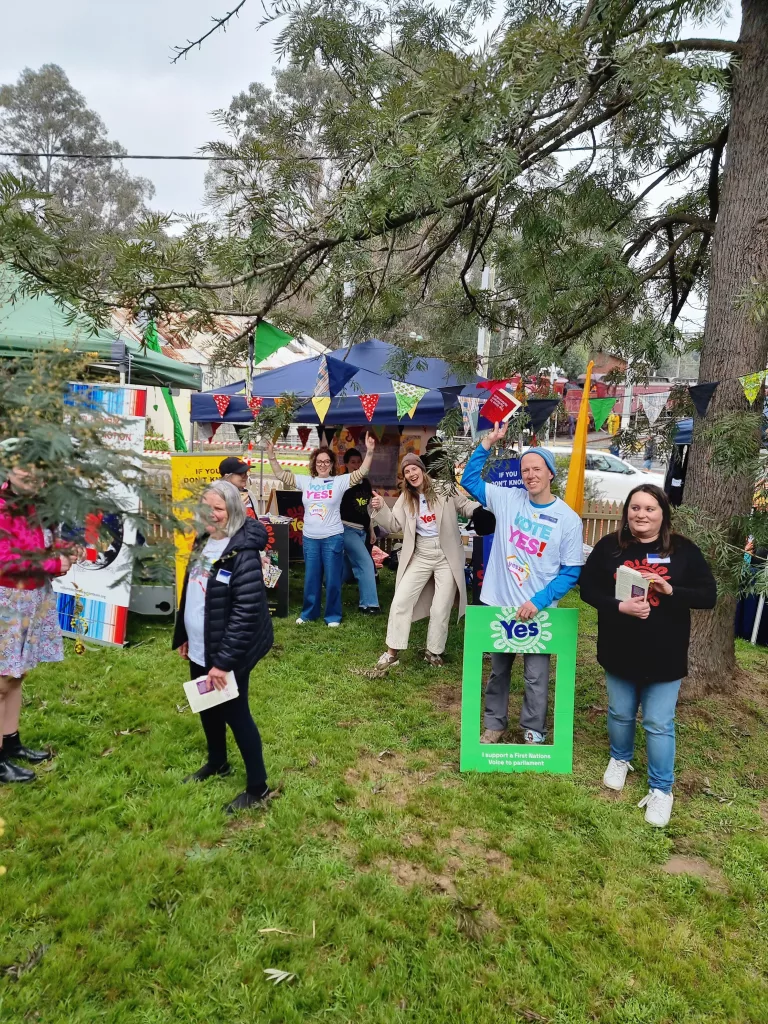
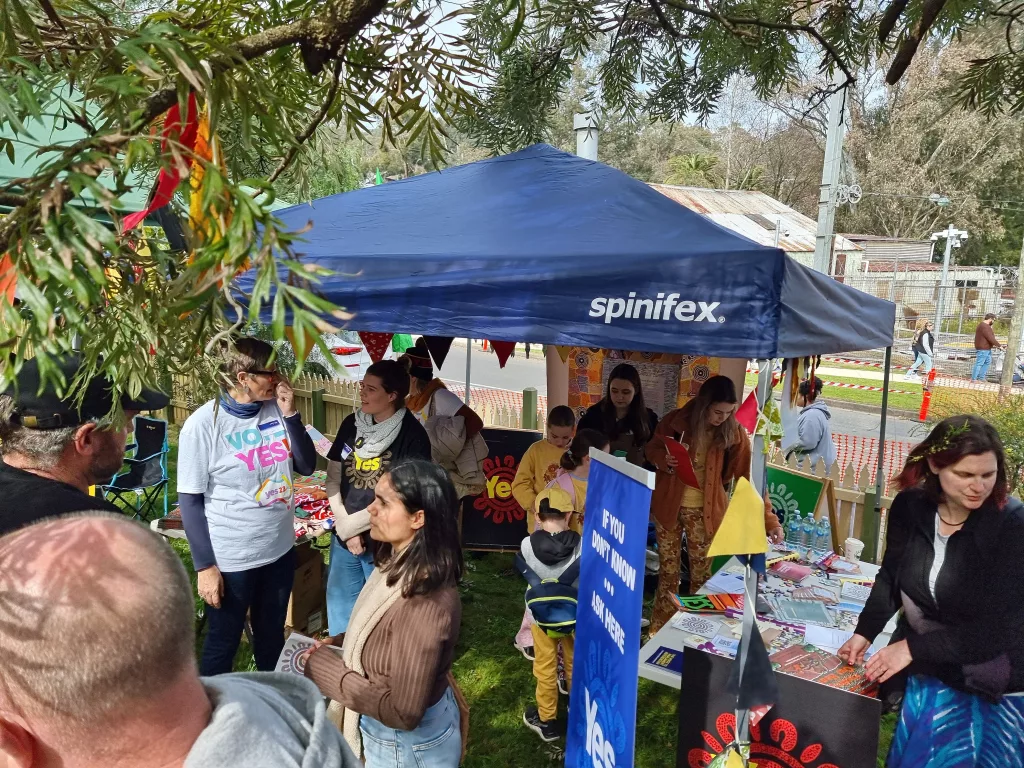
I spoke to teenagers about to cast their first vote, business people, tradies, young families, new Australians, and towards the end of the day a beautiful elderly woman who said she was 92 and asked me to read the children’s book we were sharing – every now and then interrupting me with questions like “why did they take those children away?”
If you thought you could pick which way their thoughts were leading by their age, or job, culture or religion, you’d likely be wrong.
We were presented with questions such as “how would people on The Voice be selected”? (They would be selected by Aboriginal and Torres Strait Islander people). “What would they do?” (They will be able to offer suggestions and advice on legislation or policies that go through Parliament or government on how they could work better). “Would having a voice to Parliament hinder government decisions?” (No, it would slot in to the existing systems of consultation that Parliament already uses and it would have no veto power).
Naturally some people expressed doubts and wanted to run their opinions past us. I was asked by one person: “can’t Aboriginal people already create their own groups to offer advice to Parliament? Why do we need another one, and why does it need to be in the Constitution?”
It’s a good question, and, as I told this man, it indicates he has thought hard about how our system should work. These are exactly the sorts of questions all of us should be thinking about. My answer was that, yes, there are many groups of Aboriginal and Torres Strait Islander people who try to offer advice already. Sometimes they are heard, but often they are not. Politicians, as we know, will often cherry pick a group that supports them and ignore those that don’t.
We know that different governments have tried to make changes to improve things, but we also know – through the Closing the Gap reports every year – that they simply are not working.
A sole, authoritative, and representative voice would be difficult for future governments to ignore simply for political convenience. At the very least they’ll have to listen to it, and if they eventually choose to ignore it, they’ll have to explain why.
Having The Voice in the Constitution means that governments of any persuasion will benefit from the availability of this advice and won’t be able to abolish it simply because it doesn’t suit their current political agenda.
I’m not sure this man was convinced by my answer, but our conversation was sincere and polite. It gave me something to think about, and I hope it did the same for him.
Ultimately, as I said in many other conversations, the most important thing is that we all take some time to think deeply about this issue. Our polling day choice should genuinely mirror our values and vision for what kind of country we want to be.
If you vote yes, after thinking this through and deciding it aligns with your values, then you’ve done what you need to do. If you vote no, the same sentiment holds.
Investigating beyond the daily news grabs is the key. It means your decision, whichever one it is, will be sound.
The beautiful sunny day eventually wound to a close. The whistles of steam trains faded into the distance and the excited chatter of children subsided, leaving just the colourful wattle blossoms heralding, as they always do, the end of winter.
We left feeling exhilarated. I learned that discussions which involve listening and mutual understanding can be fruitful and enlightening no matter what your opinion is. Perhaps, as a by-product of this referendum, we might witness a little bit more compassion in our politics and a tad less acrimony.
Maybe like the wattle festival signifies in our weather, the referendum could mark the end of our political winter, and the start of a new Spring?

